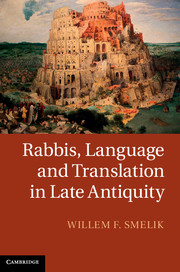Book contents
- Frontmatter
- Dedication
- Contents
- List of figures and tables
- Acknowledgements
- List of abbreviations
- Note on manuscripts and editions
- Introduction
- I Multilingualism and the holy tongue
- II The locus of translation
- 4 The terminology of translation
- 5 Chanting the Scriptures
- 6 Between Holy Writ and Oral Tora
- 7 Ashurit and alphabet
- III Rabbis and translation
- Conclusion
- Appendix
- Bibliography
- Index of texts
- Index of subjects
5 - Chanting the Scriptures
from II - The locus of translation
Published online by Cambridge University Press: 05 December 2013
- Frontmatter
- Dedication
- Contents
- List of figures and tables
- Acknowledgements
- List of abbreviations
- Note on manuscripts and editions
- Introduction
- I Multilingualism and the holy tongue
- II The locus of translation
- 4 The terminology of translation
- 5 Chanting the Scriptures
- 6 Between Holy Writ and Oral Tora
- 7 Ashurit and alphabet
- III Rabbis and translation
- Conclusion
- Appendix
- Bibliography
- Index of texts
- Index of subjects
Summary
Among the variables which define a text, context takes pride of place: what a text means to whom and where. No context is constant, stable, or unchallenged, but proper attention to the iteration of a text in extratextual conditions tells us something about that text; not so much about the established context for proper interpretation, but about the multiple contexts of textual instantiation.
If there ever was a range and variety of possible contextualizations for reading the Scriptures, rabbinic literature does not divulge the details to us. Although it is only to be expected that differences of context may have informed the way the Bible was read by Jewish communities in Palestine and the Diaspora, rabbinic literature describes the public recitation of the written Tora as a unitary and consistent practice with little room for variation. The public reading of the Tora and portions of the Prophets should be accompanied by an oral-performative translation, verse by verse, so that each Hebrew verse would be followed by an Aramaic version. The resultant bilingual, antiphonal text is commonly regarded as the norm in the Palestinian synagogues of Late Antiquity.
But in Late Antique Palestine the context of public reading was far from uniform: the coastal area and the Hellenistic cities, Jerusalem, Idumea, the (Lower and Upper) Galilee and the Golan did not share the same conditions and history, and these areas, let alone the various regions of the Western Diaspora, were probably not consistent in the degree to which they conformed to the legal decisions of rabbinic leaders.
Information
- Type
- Chapter
- Information
- Rabbis, Language and Translation in Late Antiquity , pp. 171 - 219Publisher: Cambridge University PressPrint publication year: 2013
